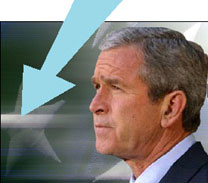JIM.LOBE
Bush policies spur Iraqi rebel resistance, say 500 national security experts (FCN, 10-25-2004)

WASHINGTON (IPS/GIN) – Although morale among members of the professional corps of the U.S. military remains generally high, their confidence in President George Bush and other civilian government leaders slipped substantially during 2005, according to major new survey recently released by the Military Times.
The survey, the third in an annual series, found that approval of Pres. Bush’s Iraq policies by military professionals fell from nearly two-thirds at the end of 2004 to just 54 percent in late 2005, while their support for his overall performance dropped from 71 percent to 60 percent over the course of the year.
While both ratings remain significantly higher than the approximately 40 percent approval given Pres. Bush and his Iraq policy by the general public in late 2005, the military levels appear remarkably low given the fact that 60 percent of the military respondents identified themselves as Republicans–twice the percentage of the civilian population.
Among self-described Republican civilians, Pres. Bush’s approval ratings have been much higher–80 percent or more–while support for his Iraq policy among civilian Republicans stands at about two-thirds.
The civilian leadership in the Pentagon also appears to be viewed with skepticism. Fifty percent of respondents said they did not believe the civilian leadership of the Defense Department had their “best interests at heart.”
The vast majority of military respondents also took issue with the Bush administration’s estimates that the Iraqi military would be ready to replace large numbers of U.S. troops over the next year or two. Only 29 percent agreed with that projection, while 40 percent said it would take three to five years, and an additional 24 percent said from five years to more than 10 years.
Fifty-six percent of respondents said the U.S. should have gone to war in Iraq; 26 percent said no–an increase of 5 percent compared with a year ago–while the remainder said they either had no opinion or declined to answer.
Similarly, confidence that Washington would succeed in its mission there also fell in 2005. At the end of 2004, 83 percent respondents said success was either “very likely” (38 percent) or “somewhat likely” (45 percent). One year later, the comparable percentages were 31 percent and 42 percent, respectively–a combined decline of 10 percent.
The increased skepticism was reflected in the loss of confidence in Pres. Bush’s handling of the war. The nine percent decline in approval of his performance was particularly striking in light of the relative continuity in answers to most other questions.
“It’s like they’re saying, ‘I thought these guys knew what they were doing,’”
observed Lawrence Korb, a defense analyst and senior Pentagon official under former President Ronald Reagan currently at the Center for American Progress.
Aside from the decline in confidence in Pres. Bush and his Iraq policies, the survey’s most striking finding was the loss of confidence in Congress. Only 31 percent of respondents said Congress had the professional military’s “best interests at heart.” Just one year ago, the figure was 63 percent.












